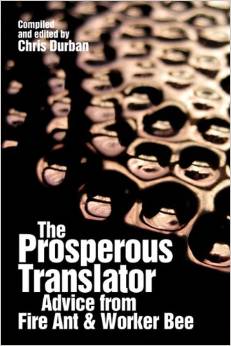Translators as Rabid Philosophers of Meaning
February 20, 2015
A book on translation and translators that’s concise, brilliant, entertaining and ultimately indispensable.
It’s been five short years since its publication, but in this sparkling gem of a book, Chris Durban shatters the Poverty Cult thinking that still drives much of the labor pool that sustains the global translation services industry: the success-averse, hand-wringing, endlessly apologetic talent who have dutifully taken up their position as the trudging tortoise supporting three elephants, silently holding up the world, as in the Hindu creation myth.
A refreshing blast of fresh air – part wake-up call, part tough-love and part an earnest appeal to practicality – this book stands in stark contrast to the endless parade of post-recession books and Internet 10-step guides on how to become a madly successful freelance translator by standing downwind of a person speaking kitchen Spanish and absorbing all the expertise you’ll ever need by pure osmosis.
The book draws on a wealth of material at the core of the 14-year-old “Fire Ant and Worker Bee” advice column for translators and interpreters which itself grew out of relationships formed in the pre-Cambrian CompuServe Foreign Language Education Forum (FLEFO), an ancient watering hole for translators, some of whom would gather around the campfire to grumble about how mistreated and misunderstood they were in this vast, cruel, English-speaking, monolingual world.
It turns out that some of the non-grumblers were making a ton of money all along. This book represents the countervailing philosophy of those people – in this analogy, the masters of the Iron Age – who gave up on the fireside navel-gazing to seize their own destinies and reshape their world.
The format of the book is Q&A, the tone is frank, clever and often funny, but the message is utterly practical: You too can succeed as the author herself has, but the path is trickier and far more perilous than it at first seems.
The most hazardous tar trap for beginning translators turns out to be their own assumptions. The first chapter, wisely entitled: “Is This Option Really For Me? Straight Talk on Who Is Likely to Make It and Who Should Look Elsewhere,” contains detailed questions from people who are considering becoming professional translators themselves. But the questioners reveal an inordinate fascination with their own relative strengths and weaknesses in various languages, which is truly the wrong focus. While it’s admirable that these people are passionate about language and words (good!) it turns out that they are not very passionate about much else in the world.
This is what my daughter would call an Epic Fail.
The reason this fails is that translation is not about words. It’s about what the words are about.
It’s not just beginners who are ensnared by this idea. David Bellos wrote several thousand words on the topic of the elusiveness of meaning and uselessness of individual words in the otherwise fascinating and often insightful “Is that a Fish in Your Ear?”, yet never got even remotely close to capturing the same idea I did using the two short phrases above. (Disclaimer: those phrases represent the distillation of a lifetime translating and thinking about the nature of translation.)
It turns out that the most successful translators are at their core rabid philosophers of meaning. They mix and mingle and blend seamlessly into crowds of investment bankers and attorneys and physicists and engineers. And that’s because those translators speak the same meaning. This is the core of the dictum that all successful translators must have “subject-matter expertise,” an unhappily turgid and dense way of saying that you must know a lot about how the world works to people who can pay you to know these things. Budding translators seeking to work in today’s commercial translation market are best advised to attend law school or spend years in commodity trading pits or solder printed circuit boards or do any number of other dirt-under-the-fingernails jobs rather than obsess about memorizing pocket grammars.
This is also why professional translation is an excellent second career. And often a trying, difficult and sometimes futile first one.
The chapter headings in this book all pull double duty – they are instructive in their brevity – and posit both the question and answer in a Zen-koan-like way: “Pricing and Value,” “Specializing: Establishing Your Brand” and especially, “Marketing and Finding Clients: Regaining Control and Building a Strong Client Portfolio.”
The fact that the author must come right out and say “regaining control” in a chapter heading on how to find the right clients in today’s global commercial translation market – a multibillion dollar (that’s billion with a Carl Sagan plosive “b”) market by any reckoning – is instructive and illuminating. Translators’ market passivity, e.g. their startlingly near-universal willingness to take whatever fees are offered and to accept work from whatever clients are standing athwart the road they happen to be walking on, remains an endlessly persistent headwind that even this author must overcome to be heard.
It’s unclear why this is so. It’s been suggested (uncharitably) that translators are by their nature passive. After all, somebody else wrote the original text and created the original ideas. But such a statement is far more revealing about the painfully limited perspective of any person who would attempt to make such a claim. To cite just one example, in every meaningful way the Renaissance was above all else the work of translators, and the formative structures of the written form of the major European languages today were built foremost and principally on the labor, sweat and creative passions of translators. Often at the cost of their own lives.
It’s far more accurate to say that translators can do what authors do, but can do it in more than one language.
Perhaps the greatest challenge to insisting that translators and interpreters grab the reins and lead the charge on the commercial stage as the author of this fine work has done is that translators and interpreters are perfectly happy secretly standing to the side, defining, determining and in every way controlling the meaning of every multilingual conversation, statement, claim, patent, invention, ad, novel, poem, lawsuit, theory, proof, negotiation, settlement, movie and play that take place in any medium.
Everywhere.
Which – when you think about it – is way cool.
Best to order the book from here:
http://www.lulu.com/shop/chris-durban/the-prosperous-translator/paperback/product-12794595.html
This post was originally published in a slightly modified format as a review on Amazon.com in 2012.
Follow me on Twitter: @Kevin_Hendzel








Thanks for sharing! May I complete my moto below? [bottom line]
___________________________________________________________________
Hilton Felicio dos Santos, Eng, MSc, PhD
English into Portuguese (BR) and vice-versa
São Paulo-Brazil
ABRATES (En > Pt_Br): Accredited since 2003; ATA (PLD): Member since 2004
Tel +55 (11) 3676-0548 /9 9261-9373
http://www.proz.com/profile/80549
(Proz.com Certified PRO network)
http://www.atanet.org/onlinedirectories/tsd_listings/tsd_view.fpl?id=7721
___________________________________________________________________
Hilton’s moto addition: “Translation is not about words. It’s about what the words are about” (Kevin Hendzel in his ‘Word Prism’ blog – Friday, February 20th, 2015)
Thanks for reprinting this review, Kevin — much appreciated. And a tip of the hat to the amazing Eugene Seidel, a witty wordsmith with a wicked sense of humor who co-authored the column in the early years (up to 2005).
Chris
I remember reading the instalments of Fire Ant and Worker Bee in the old format (and had to look up what a “fire ant” is). The no-nonsense, back-to-basics advice makes much more sense to me now that I have the benefit of the perspective of my own experience. The advice itself ages well. It is high time I read the book and reviewed my own strategies. Thank you for reposting the review, Kevin – and thank you Chris Durban for never having beaten about the bush!
Good simultaneous/conference interpreters work in similar way. If one is lucky enough to have a good speaker and good topic, it is sometimes hard not to overrun the speaker, when you are on the same “wave” with him/her and see the same thing.